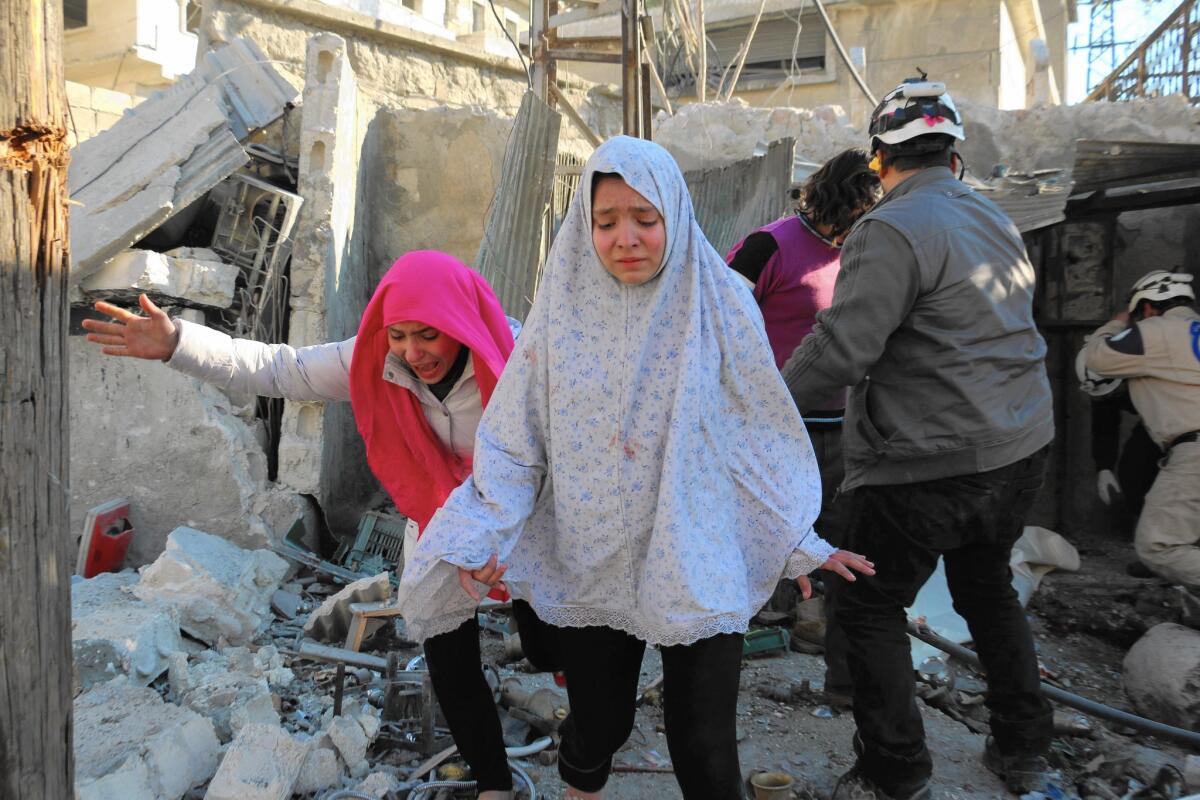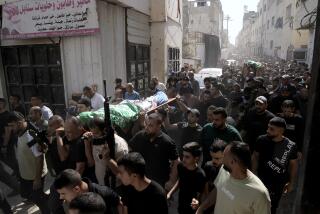Syria talks at make-or-break point as humanitarian disaster widens

Girls make their way through a rebel-controlled neighborhood in Aleppo after an airstrike on Feb. 8.
Reporting from Washington â U.S. officials see Thursdayâs attempt to renew negotiations on Syria as a make-or-break moment that could lead to a cease-fire or to a disastrously downward spiral in an already brutal war.
World powers will convene in Munich, Germany, including allies of Syrian President Bashar Assadâs government, principally Russia, and those who support the fragmented opposition attempting to oust him, led by the United States.
The goal is to make progress toward an ever-more elusive cease-fire and persuade the warring parties to return to peace talks, which broke down this month, shortly after they had begun.
See more of our top stories on Facebook >>
The renewed attempt at diplomacy comes as pro-Assad forces, backed by Russian airstrikes and Shiite Muslim fighters from outside Syria, are advancing on the northern city of Aleppo, which has been divided between opposition and government control for almost four years. Retaking Aleppo would be Assadâs most significant victory in nearly five years of war.
The pro-Assad offensives increasingly are led by Iranian and Lebanese Hezbollah commanders and reportedly include thousands of Afghan fighters recruited in Iran.
A United Nations investigation has accused the Assad government of a policy that âamounts to exterminationâ of civilians in Aleppo by denying access to food convoys and humanitarian relief.
On Wednesday, government warplanes pounded Tal Rifaat, an important rebel-held town 12 miles south of the Turkish border.
In Aleppo, Russian airstrikes destroyed two hospitals, leaving 50,000 people without critical care, according to Col. Steve Warren, spokesman for the U.S.-led military coalition battling the militant group Islamic State.
Another 50,000 people have been displaced, mostly from Aleppo, according to the International Committee of the Red Cross, and thousands of refugees are fleeing to the border with Turkey.
âWeâre concerned that with the reduced humanitarian access and continued strikes by the Russians and the Syrians, thousands of civilians are suffering,â Warren told reporters in a teleconference from Baghdad. âThe situation in and around Aleppo has become, in our view, increasingly dire.â
The Syrian governmentâs successful offensives have made Assad and his allies, including Russia and Iran, less interested in a cease-fire.
âWe are all very, very aware of how critical this moment is,â Secretary of State John F. Kerry said Tuesday at the State Department. âRussia needs to join with all of us in understanding that this cannot go on.â
He said Russiaâs airstrikes around Aleppo âare making it much more difficult to be able to come to the table and to be able to have a serious conversation.â
The Syrian civil war, which has claimed more than 200,000 lives, could escalate if no cease-fire is reached. But the odds of a deal are slim.
Diplomats say bringing together the disparate opposition groups â from moderate Sunnis to Islamists to Kurds â could prove impossible. Many of the rebel groups insist on an end to the slaughter before they sit to talk.
âThere will be no political process if ⌠the opposition groups cannot show progressâ in ending aerial bombardment of besieged towns, Jan Jaap van Oosterzee, Middle East policy officer for PAX, a Netherlands-based humanitarian organization long active in Syria, said Wednesday.
Saudi Arabia and the United Arab Emirates have said they are prepared to send troops to back the rebels against Assad, broadening the war even further. Itâs unclear how many troops they might commit, where or when.
In 2014, Saudi Arabia launched airstrikes against Islamic State targets in Syria but then shifted its military attention to Yemen, where it is increasingly bogged down in a war with what Riyadh says are Iran-backed Shiite rebels.
Russia claims to target âterroristsâ in its bombing runs but, according to U.S. officials, actually is killing Assadâs opponents and civilians.
Russian officials have brushed aside such criticism and showed little inclination to cooperate with Washington or other members of the unanimous group of nations that approved a United Nations Security Council resolution in December calling for a cease-fire, a political process and a transition to a new government.
Russian Foreign Minister Sergei Lavrov said this week his government had given Washington a new âconcrete schemeâ for settling the Syria conflict.
State Department spokesman John Kirby would not confirm that the Russians had offered anything more than âviews.â
Turkish Prime Minister Recep Tayyip Erdogan on Wednesday lashed out at Washington for its refusal to regard a Syrian Kurdish group, the Democratic Union Party, or PYD, as a terrorist organization.
Turkey and the U.S. agree on labeling a Turkish Kurdish group, the Kurdistan Workers Party, or PKK, as terrorists, but not the PYD.
âAre you on our side or the side of the terrorist PYD and PKK organization?â Erdogan demanded, a day after summoning the U.S. ambassador in Ankara for a formal complaint.
The U.S. needs the Kurds, often the most talented fighters, but also Turkey and risks alienating one side as it attempts to strike a balance within the coalition.
The Obama administration is coming under increasing criticism for failing to stop the bloodletting in Syria or even doing enough to protect the very forces it has helped train and arm.
NEWSLETTER: Get the dayâs top headlines from Times Editor Davan Maharaj >>
Newspaper op-eds, including some by recent administration officials, have begun to compare Aleppo to Sarajevo, the besieged capital of Bosnia-Herzegovina that came to symbolize Western inaction in the face of Russian-backed Serbsâ slaughter of thousands of civilians in the 1990s.
Several options are on President Obamaâs desk, including the deployment of additional special operations forces or the establishment of so-called safe havens where civilians could shelter and receive humanitarian aid without fear of attack.
Obama is reluctant to deepen Americaâs role in another Middle East war, especially in the waning months of his presidency. U.S. officials also argue that measures such as safe havens would require an expanded role for U.S. troops to protect the enclaves.
Instead, the administration is focusing on getting a cease-fire â and trying to shift the blame to Russia if it fails.
âWe are not blind to what is happening, and Russia needs to contribute in significant ways to sustaining the ability of the opposition and others to come to the table and create an atmosphere within which you can actually have a negotiation,â Kerry said. âBut theyâve made that very, very difficult over the course of the last days.â
Kirby, his spokesman, was even more blunt during a tense, testy briefing when asked what would happen if Russia doesnât cooperate.
âYou have more refugees. You have more violence. More bloodshed. And Syria falls further and further in â in this death spiral that itâs on,â he said. âThere is no other alternative out of that.â
Special correspondent Nabih Bulos in Amman, Jordan, contributed to this report.
For more news about global affairs, follow @TracyKWilkinson
ALSO
Shoddy construction suspected in Taiwan earthquake collapse
Wild elephant rampages through Indian town, smashing cars and homes
Islamic State is the âpreeminent global threat,â U.S. intelligence director says
More to Read
Sign up for Essential California
The most important California stories and recommendations in your inbox every morning.
You may occasionally receive promotional content from the Los Angeles Times.











